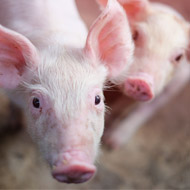Chief vets raise awareness of African Swine Fever risk

"ASF presents an important and increasing risk to the pigs in the UK" - Christine Middlemiss, CVO UK.
Chief veterinary officers have joined forces to raise awareness of the risk of African swine fever (ASF) to the UK’s pig population.
Christine Middlemiss, chief veterinary officer (CVO) UK, Robert Huey, CVO Northern Ireland, Sheila Voas, CVO Scotland and Christianne Glossop, CVO Wales have all endorsed an article raising awareness of the growing risk of the disease, which has been spreading throughout eastern and central Europe.
Christine Middlemiss, CVO UK, said: “ASF presents an important and increasing risk to the pigs in the UK. In an outbreak, heightened disease control measures and a potential ban on pork exports could have a financial impact on the pig industry.
“The arrival of ASF would also affect the modest export market of our native rare breed pigs, and those with small populations and genetic pools could be heavily compromised if they had to be culled for disease control purposes.
“We must all play our part in raising awareness with all pig owners of this significant risk, promoting good biosecurity, and ensuring early detection and effective control if the worst happens.”
The article was sent to official veterinarians on Thursday (8 November) by the Animal & Plant Health Agency (APHA). Together with information on how to keep pigs free of ASF, the article also includes images of the clinical signs and pathology of ASF.
‘Anything you can do to promote these messages amongst your colleagues and to your pig-keeping clients is valuable in reducing the risk of introduction of ASF to the UK, whether their pigs are pets, or in small-scale or commercial herds,’ said the APHA. ‘In addition, if you are visiting clients who have pigs, take the opportunity to discuss and demonstrate best biosecurity practices to them.’
Anyone who suspects they have identified ASF is urged to report the disease immediately to the APHA. Guidance on how to spot and report the disease can be found at https://www.gov.uk/guidance/african-swine-fever



 The veterinary mental health charity Vetlife is inviting the veterinary community to join it for a sponsored cold-water dip.
The veterinary mental health charity Vetlife is inviting the veterinary community to join it for a sponsored cold-water dip.